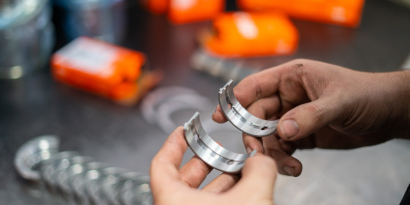Every installer know that head gaskets are vital components for a car, fulfilling a crucial role to ensure a proper engine sealing and functioning. This is precisely why identifying damaged gaskets early is essential to maintain engine performance and avoid that this small problem becomes a major headache — for the installer and also for the car owner!
Not to mention that, when Experts recognize the signs early, they gain time to carry out a service and avoid that other parts be damaged over time. This is why, in today’s article, we have prepared valuable tips that will help the installer identify damaged gaskets in the engine and also important advices for those who want to do their best in the installation of these components. Join us!
5 signs that the engine may have damaged gaskets
Identifying damaged gaskets can save the engine and pockets of your customers. But it is necessary to pay more attention at the time of making this diagnosis, as some of the signs are quite subtle, as you will see as follows:
1 – Coolant leak
If your customer arrives at the office complaining about stains on the ground under the vehicle, be on the alert! If these stains are green, orange or pink, it is very likely that the coolant is leaking through the gasket. To make sure this is happening, check if the coolant level in the reservoir is decreasing consistently and, if this is the case, schedule a gasket replacement as soon as possible!
2 – Oil and water mix in the engine
We already know that the oil must be checked regularly, isn’t it? If during these checks you notice the lubricant has a milky texture or that there is water visible in the carter oil, know that his is a strong indication that there is damaged gaskets in the head, compromising the sealing of different sets and allowing this mix, which in the long run can become a useless mixture and harm car functioning.
3 – Engine overheating
The recurring rise in engine temperature is also a common symptom of problems in head gaskets. If the gauge is constantly hitting the red zone — or if the customer indicates that the engine is often overheating, even without having travelled large distances —, it is worthy to check the integrity of the gasket.
4 – Irregular pressure in the exhaust pipe
Hearing unusual wheezing sounds coming from the engine compartment and noticing a more intense amount of exhaust gas than normal are signs of irregular pressure in the exhaust system — and this usually occurs due to damage in the gasket, which can’t seal the engine set properly anymore and ends up allowing the gas generated during car functioning to leak through the wrong places.
5 – Unequal compression in cylinders
This is to those who are more experienced. If you, the installer, already suspect that there is something wrong with the head gasket, know that a cylinder compression test can provide valuable information, either confirming or ruling out your hypothesis. Here, with the proper tools, you only have to check the compression level of each one of the cylinders and compare the results: if there is very significant differences among them, it is almost certain that there are problems in the gasket.
Here is a tip: deepening the understanding of these signs and symptoms helps the Expert identify more precisely when there is something wrong with the head gasket and can represent an important competitive differentiator for your customers. So, it is worthy to practice it a lot, seek skilled workers whenever necessary and, thus, guarantee increasingly satisfied customers at your auto repair shop.
Oh, and don’t forget to pay extra attention to gasket installation!
Obviously, when identifying damaged gaskets, the next step involves repairing the vehicle and replacing these components with new parts. And to guarantee the offer of a high-quality service to your customers, it is necessary to have in mind that the installation of gaskets is a very delicate process — especially if we consider that a considerable part of the problems that manifest in gaskets are caused precisely by the lack of care during their installation. Therefore, here are some extra tips:
Do your best at cleaning it: before installing a head gasket, make sure the engine block surface and the cylinder head surface are clean and even. Any irregularity can lead to sealing problems.
Do not overtighten it: follow the manufacturer’s torque specifications to tighten cylinder head bolts. This is essential to guarantee a proper sealing and not to harm the gasket during the process.
Did you install it? Try the following: after installing it, check if there is no coolant leak and whether exhaust pressure is at a normal level. If there is any problem, make the necessary adjustments before delivering the vehicle.
Use only high-quality parts: always prioritize high-standard head gaskets that are made by a reliable supplier and compatible with the vehicle. This will reduce the risk of having problems in the future.
And we speak about quality with authority, as, here at RIO, the Expert will find a complete catalogue with over 5 thousand items, with different sizes and models, for installation in the main brands of light vehicles, utility vehicles, trucks, agricultural machinery, and motorcycles — including a wide range of gaskets that meet the requirements of the main automakers in Brazil and abroad, with quality attested by experience and by certifications we have achieved over the years.
Talk to us, see our portfolio and start creating movement today with those who really know about cars! And if you like today’s content, don’t forget to share it with your Expert friends on social media and WhatsApp as well. See you next week here at our blog or on Youtube with more technical tips from RIO!





